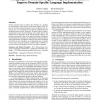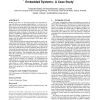1262 search results - page 54 / 253 » Techniques for obtaining high performance in Java programs |
142
Voted
ICFP
2010
ACM
15 years 3 months ago
2010
ACM
Partial evaluation aims to improve the efficiency of a program by specialising it with respect to some known inputs. In this paper, we show that partial evaluation can be an effec...
129
click to vote
CONCURRENCY
2004
2004
User transparency: a fully sequential programming model for efficient data parallel image processing
15 years 2 months ago
Although many image processing applications are ideally suited for parallel implementation, most researchers in imaging do not benefit from high performance computing on a daily b...
148
Voted
ICML
2010
IEEE
15 years 3 months ago
2010
IEEE
A sparse representation of Support Vector Machines (SVMs) with respect to input features is desirable for many applications. In this paper, by introducing a 0-1 control variable t...
142
Voted
CODES
2007
IEEE
15 years 9 months ago
2007
IEEE
Multiprocessor SoCs are increasingly deployed in embedded systems with little or no security features built in. Code Injection attacks are one of the most commonly encountered sec...
115
click to vote
DSD
2003
IEEE
15 years 8 months ago
2003
IEEE
Cache design for high performance computing requires the realization of two seemingly disjoint goals of higher hit ratios at reduced access times. Recent research advocates the us...


